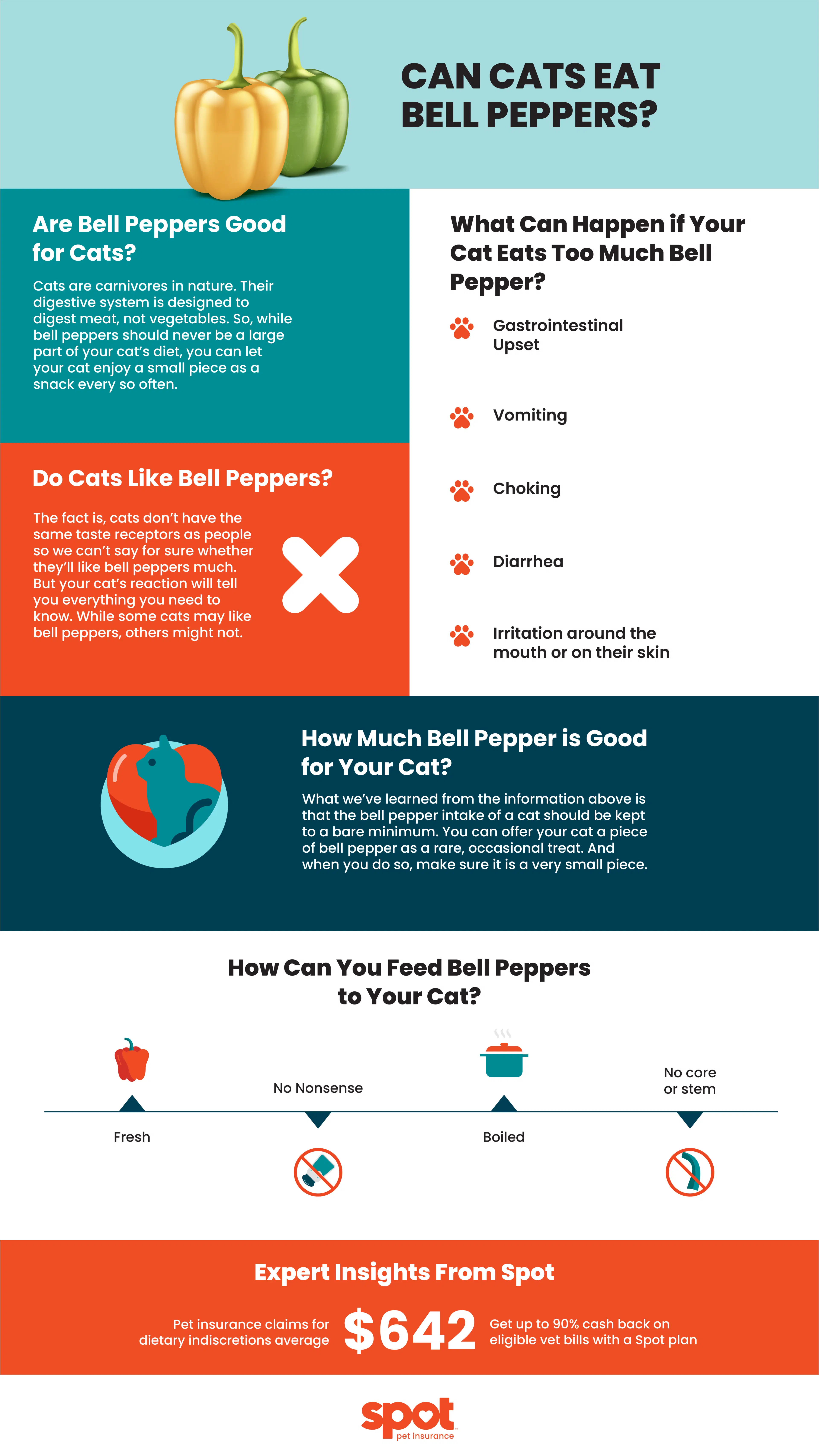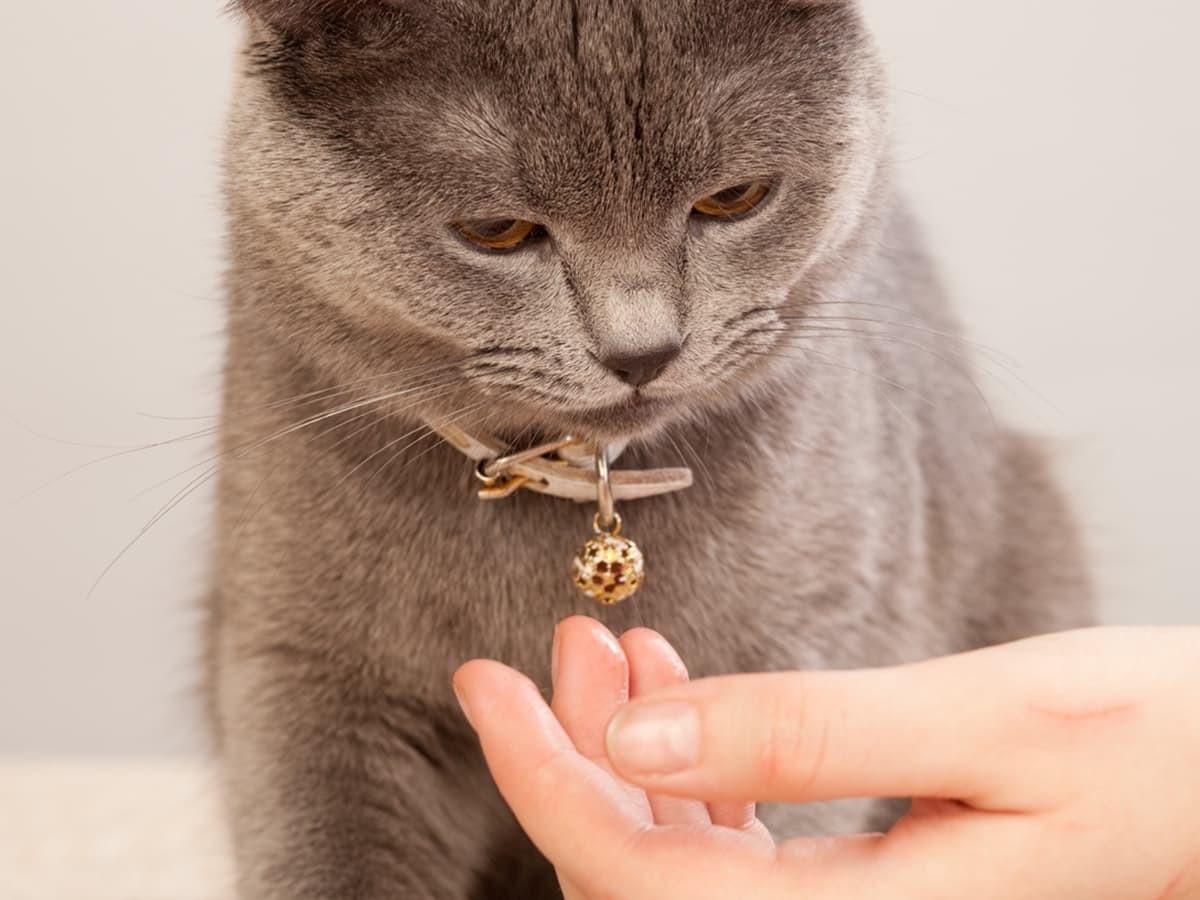The answer is “Yes”. Cats can have bell peppers. Green, orange, yellow, and even red bell peppers are all generally safe for your cat to snack on.1
But there are a few things you need to know before feeding your cat bell peppers. It’s important to know what parts are safe for your cat, the best way to feed your cat peppers, and how much and how often your cat can have them.

Are Bell Peppers Good for Cats?
An 80-gram serving of bell pepper, irrespective of the color, provides about 17 calories, 0.6g protein, 0.2g fat, 3.4g carbs, 1.8g fiber, 173mg potassium, 60 mcg folate, and 101mg vitamin C.2 Now an average human may be able to extract all the benefits but is it the same for cats? Honestly, no. Cats can’t extract all the same benefits we can from peppers.
Cats are carnivores in nature. Their digestive system is designed to digest meat, not vegetables. Your cat gets the blood sugar it needs by breaking down protein and extracting the nutrients from it. A diet with a lot of fiber or carbs can cause digestive issues in the short term and even lead to a shorter lifespan in the long term. So, while bell peppers should never be a large part of your cat’s diet, you can let your cat enjoy a small piece as a snack every so often.
But just because bell peppers are not spicy, does not mean that they are completely safe to give to your cat at any time. Feeding your cat bell peppers regularly can cause abdominal pain and even nutritional deficiencies in the long run.3
Health Benefits of Bell Peppers for Cats
As mentioned above, bell peppers have a few health benefits, but cats might not be able to extract them. Here we will break down the nutrient values found in bell peppers and evaluate if they are beneficial for cats3 -
Vitamin A – Bell peppers are known for their high vitamin A content. On average, a bell pepper has 353 IU of vitamin A, which isn’t bad. But when you compare the same with a raw liver, which has 16,900 IU of vitamin A, the benefit is negligible.
Vitamin B – Pyridoxine, a type of vitamin B, is also found in bell peppers. It helps in the formation of red blood cells. But again, the quantity found in bell peppers is very low. Organ meats, on the contrary, can be a great source of vitamin B.
Vitamin C – An average red bell pepper has about 1.5 to 2 times the reference daily intake of Vitamin C, recommended for humans. But again, that’s ‘For Humans!’. Cats don’t need this much vitamin C.
Vitamin E – Needs fats to be digested. And as mentioned above, bell peppers have a negligible amount of fat; close to 0g.
One more thing to note here is that these peppers have no Vitamin B12, the vitamin responsible for organ health and longevity.
How Much Bell Pepper is Good for Your Cat?
What we’ve learned from the information above is that the bell pepper intake of a cat should be kept to a bare minimum. You can offer your cat a piece of bell pepper as a rare, occasional treat. And when you do so, make sure it is a very small piece.
Do Cats Like Bell Peppers?
The fact is, cats don’t have the same taste receptors as people so we can’t say for sure whether they’ll like bell peppers much. But your cat’s reaction will tell you everything you need to know. While some cats may like bell peppers, others might not. Even in cats who do like peppers, there is a high chance that it is only out of curiosity or because of the interesting texture.
How Can You Feed Bell Peppers to Your Cat?
For those occasional moments when you want to feed tiny pieces of bell pepper to your cat, here are a few things you should keep in mind.
Fresh – Always make sure that the bell pepper is fresh, plain, and has been washed thoroughly. You don’t want your cat to ingest any chemicals that could have been sprayed onto the pepper.
No nonsense – The peppers should not have any seasoning, dressing, or oil on them.
Boiled – It is always better to boil down the pepper before feeding it to your feline to help avoid a choking hazard from the firm texture of the raw pepper.
No core or stem – Avoid giving your cat the core of the pepper with the stem and seeds. They can be a choking hazard.
What Can Happen if Your Cat Eats Too Much Bell Pepper?
If your cat ate a lot of bell pepper, keep an eye out for the following symptoms.1 You should contact your vet right away if you see –
Gastrointestinal upset
Vomiting
Choking
Irritation around the mouth or on their skin
Diarrhea
Are There Any Cats That Should Not Eat Bell Peppers?
Some cats can be more likely to get an upset stomach from eating bell peppers. For them, bell peppers should altogether be eliminated from their diet. This list can include –
Cats with allergies – If your cat tends to have allergic reactions after trying new foods, especially vegetables, then it’s advisable to avoid bell peppers. If you do give them a piece, and your cat starts showing signs of sneezing and coughing; itchiness or hives on the skin; swelling around the face; difficulty breathing; diarrhea or vomiting; lethargy or weakness, then there is a high chance that they are allergic. Contact your vet right away.
Expert Insights From Spot
While sharing our favorite foods with our pets can be tempting, it's important to remember that not all human foods are safe for our felines. Spot's internal data shows that pet insurance claims for dietary indiscretions average $642*, highlighting the importance of caution and research before sharing snacks with your pet.
Conclusion
Bell peppers may not be toxic for your purry friends, but they also don’t offer a whole lot of benefits. All the benefits found in bell peppers can be easily found in foods better suited for your cat’s digestive track such as meat, bones and organs. So, while your cat can have a couple of tiny pieces every once in a while, there are much better options than bell peppers for your furry friend.
How Spot Pet Insurance Can Help
Spot’s Accident-Only and Accident and Illness plans can help with the eligible costs of treatment if your cat is experiencing stomach issues after eating too much bell pepper. Spot's cat insurance plans can provide up to 90% cash back on eligible vet bills, so you can choose the best treatment for your pet with less worry about the cost. Get a free quote today!

As Spot’s resident cat enthusiast, I am dedicated to researching and sharing information that helps pet owners take the best care of their pets. Pet ownership comes with it’s share of challenges, but my goal is to help make this journey easier.
*Jan 2019 to Aug 2024 administrator claims data.
Ingraham, Leslie. “Can Cats Eat Bell Peppers?” Wag Walking, 13 Apr. 2023, wagwalking.com/wellness/can-cats-eat-bell-peppers.
Torrens, Kerry. “Top 5 Health Benefits of Peppers.” BBC Good Food, 6 Feb. 2023, www.bbcgoodfood.com/howto/guide/top-5-health-benefits-of-peppers.
Living, Whitney. “Can Cats Eat Bell Peppers?” Whitney Living, whitneyliving.com/can-cats-eat-bell-peppers/.
The information presented in this article is for educational and informational purposes only and does not constitute or substitute for the advice of your veterinarian.












